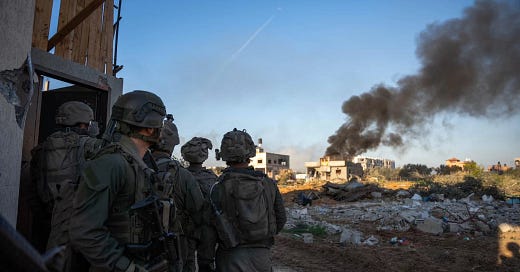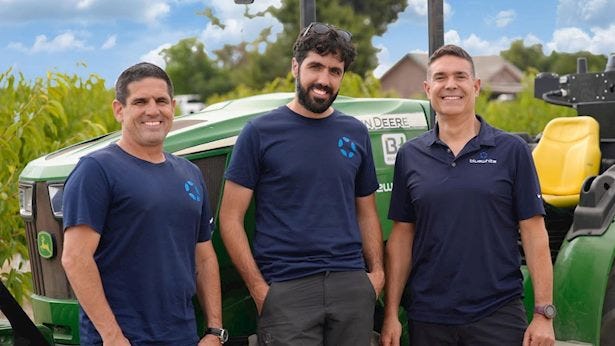DAY 110 OF THE GAZA WAR: Hamas Makes Impossible Demands For Hostage Release, Protester Block Gaza Aid, More Houthi Attacks
Tel Aviv Diary, January 24, 2024
Unfortunately, after a day of continuous rumors and repeated reports that progress was being made to secure the return of the hostages, ( I wrote yesterday, “There is much talk about a hostage deal. However, at the moment, it is only talk.”), it became clear there is very little chance of reaching a deal any time soon. Today, Hamas clarified that its prime condition for any hostage release deal is a complete end of the war, and a full Israeli withdrawal from Gaza. In addition, Hamas demands international guarantees Israel will not resume the war and that it will remove all restrictions on Gaza. These are demands that no Israeli government can accept.
In the meantime, the relatives of the hostages are getting more and more desperate. Tonight, some of the family members blocked the Ayalon Highway, again. Throughout the day, family members of both Hamas-held hostages and IDF soldiers deployed in Gaza gathered at the Kerem Shalom crossing, effectively halting the delivery of humanitarian aid destined for Gaza. The demonstrators raised poignant questions, challenging the rationale behind providing humanitarian assistance to Gaza while our hostages are subjected to such harsh conditions. Relatives of soldiers further questioned the reasoning of supplying aid to an adversary amidst conflict. They drew historical parallels by inquiring if the United States concerned itself with the food supply of the Germans during World War II. While logical in their framing, their arguments seem somewhat detached from the complex realities of international relations, particularly our nuanced dependence on the United States.
One key distinction between the perspectives of the U.S. government and a majority of the Israeli public lies in their view of Hamas and its relation to the Gaza population. Both the U.S. and Israeli governments are aligned in their objective of eliminating Hamas. However, the U.S. generally regards Hamas as a distinct, limited group of terrorists, separate from the broader Gaza population, which the U.S. considers largely peaceful. In contrast, a significant portion of the Israeli population attributes considerable responsibility to the Gazan populace, believing there is widespread support for Hamas among them. Obviously, given Israel’s dependency on the U.S., we must take their perspective into account.
Today, Channel 13 featured a thought-provoking discussion on whether the Israeli media should increase its coverage of the suffering experienced by Gazans. The consensus among the panelists leaned towards ‘No’, with one notable exception. This lone panelist argued that it's important for Israeli media to convey the Gazan perspective to better understand the global criticism of Israel's actions (a view I agree with). However, what stood out to me most in the debate was the response from Chen Zender, a veteran reporter at Channel 13, known for views that are typically not aligned with the right-wing. Zender emphatically stated that Israel has its own significant challenges to address and should not prioritize concerns about Gazans. Zender's viewpoint on this matter carry a strong personal dimension, given her unique background, i.e., her younger sister was murdered by Hamas at the Nova Music Festival.
A little positive news. There have been no rocket fire on the Gaza border communities since Sunday.
January 16th: Last rocket fired beyond the border regions.
January 8th: Last time a rocket was fired at the Tel Aviv Metropolitan Area.
December 21st: Last time Rockets were fired at Tel Aviv.
December 15th: Last time rockets were fired at Jerusalem.
IN GAZA
After surrounding Khan Younis, Israeli troops continue to push deeper into the western sector of the city. Reports indicated the killing at least 60 terrorists in encounters today. The IDF continues to search for and destroy tunnels. Today, IDF forces demolished part of what is believed to have been the main North-South tunnel that ran most of the length of the Gaza Strip.
IN THE NORTH
Today was another relatively quiet day on the Northern border, with a few barrages of missile fired by Hezbollah, which were met with retaliatory bombing by the Israeli Air Force.
HOUTHIS
Despite repeated attacks by U.S. and U.K. forces, Centcom reported today that the Houthis fired three ballistic missiles at the US-flagged and owned Vessel, the M/V Maersk Detroit. One missile fell in open sea, the other two were successfully intercepted by the USS Gravel, DDG 107.
This morning on i24News, I participated in a discussion with another panelist, Raphaël Jerusalmy, a former IDF Intelligence officer. Jerusalmy suggested that the United States should cease its dealings with the Houthis, and instead directly target Iran. In response, I pointed out that he was fantasizing. It was unlikely America would engage in such an action, especially given the general war-weariness among the American public, and the added political sensitivities in an election year. I mentioned the probable consequences of attacking Iran, such as a significant rise in oil prices. Jerusalmy ultimately acknowledged that his proposal might be more of a theoretical scenario than a reality.
Here is a clip of a different portion of our discussion.
BUSINESS
Silverfort announces the completion of a $116 million fundraising round. The company, founded by three Israeli entrepreneurs who are veterans of Unit 8200, specializes in protecting user identities for organizations. This fundraising round marks the fourth for the company, bringing its total raised funds to date to an amount nearing a quarter of a billion dollars. The current fundraising was led by the American investment firm Brighton Park Capital, along with existing investors in the company, including funds such as Greenfield Partners, following a year in which Silverfort showed over 100% growth in sales.
Bluewhite an agro-tech company providing autonomous, data-driven agriculture through Robotics as a Service (RaaS), announced today (Tuesday) that it has raised $39 million in a Series-C funding round. The round was led by Insight Partners, with participation from new investors such as Alumni Ventures, LIP Ventures, and others.
Cybersecurity company Torq has raised $42 million as an extension to its Series-B round, which was initially raised in 2021. The current round included participation from investment firms such as Insight Partners, GGV Capital, Bessemer Venture Partners, Greenfield Partners, and Evolution Equity Partners. Following this latest funding, the total capital raised by the company stands at $120 million. Founded in 2020 by CEO Ofer Smadari, CTO Leonid Belkind, and CINO Eldad Livni, Torq has offices in the United States and Israel and employs over 100 staff members. The company offers an intuitive tool for creating automations, featuring unlimited integrations and built-in templates. This enables security teams to build complex cybersecurity solutions through a simple visual interface in just a few minutes—a process that, without the system, would take hours, if not days or weeks. Over the past year, the company has reported a growth of approximately 300%, with clients including Blackstone, Carvana, Deepwatch, Nubank, Riskified, Rivian, Telefonica, and ZoomInfo.






Great update, Marc. I appreciate your straightforward perspective and focus on individuals in your narratives.